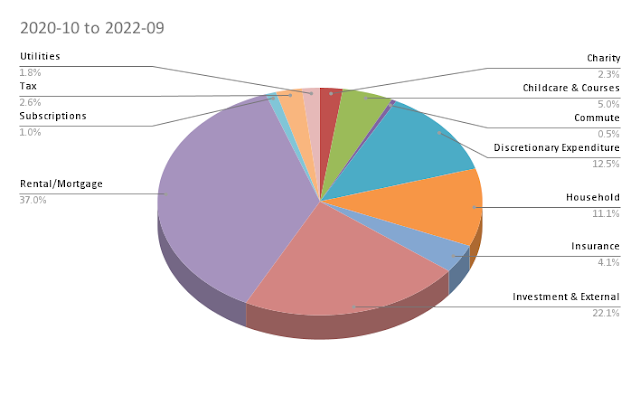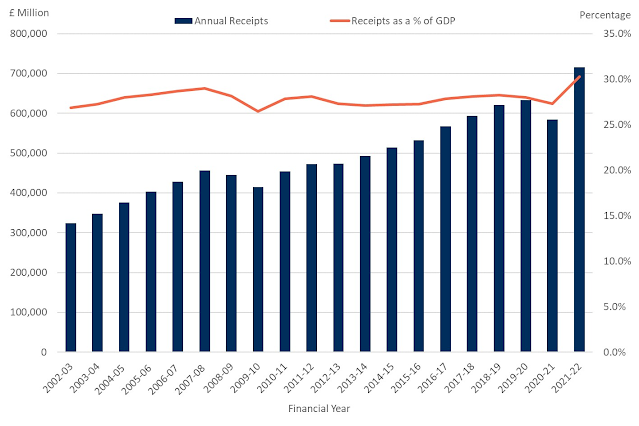Thoughts on Taxes, Laffer Curve and Growth
It has been less than a week since we have a new Chancellor, 4th in the last 4 months, in the UK. As I write this, Lis Truss is also gone. In the last few months, we have gone from wanting to be conservative with finances, to want to grow the country by being fast-and-loose with finances, to now wanting to be conservative again with finances. All along, it has been the same party in power and the same MPs representing us in the Parliament. The fact that our votes can represent 2 extremes within such a short span of time is bewildering to me at the very least. I come from a country with a volatile political history, but even that is suddenly looking dead boring in comparison.
After years of Chancellors essentially just tweaking numbers here and then, Truss/Kwasi combo is the first one to propose a significant change of direction for taxation in this country. Obviously that didn’t go well either among their fellow Parliamentarians, or the general public at large. There is obviously the issue of optics playing a bit of a part here, what with the tax changes being proposed as largely benefitting the ultra-rich and the allegations of promoting trickle-down economics, as it were.
I was originally intending to write a strongly worded criticism of the original Kwasi proposals, but I have wanted to give myself time to avoid the immediate emotions from being a factor in what I write. I would much rather write a well thought-out piece than a rant.
To start off with, I am a believer that taxation in this country is too high and doesn’t necessarily encourage investment, growth or migration. So I am supportive of the general idea of finding options to reduce taxes.
On the other end of the national budget, I don’t think the tax monies are spent much towards promoting growth. The Top line item in the budget is Social Care, at £192B, more than Education, Business Strategy, Defence and Transport put together, doesn’t necessarily do much for promoting new economic output. Correspondingly, we spend too little on things like Education, R&D, Business, International Trade and possibly even Transport, that could in theory make a much more positive impact towards economic development in the country.
In a ruthlessly efficient world, we would like to leave taxes at the point where we invest the vast majority of it into economic growth opportunities and as little as possible into anything else. However, the UK considers itself a rich country (~25th in the world), and hence considers itself responsible for the wellbeing for all of its citizens, leaving it spending a third of its tax revenues on Social Care.
So, where does all of the criticism of the past few weeks emanate from? It basically comes down to Funding & Implementation.
Funding
At a fundamental level, every government that seeks to reduce revenues must have a relatively good explanation of how the expectant gap will be filled. It could be by reducing costs, or it could be borrowing money, or finding alternative ways of filling the gap, like earnings from a sovereign wealth fund, which unfortunately the UK doesn’t possess. In case the government seeks to borrow, it must explain how the monies borrowed will update the budget and what it would mean to service the loans. The primary criticism of the mini-budget was that no such explanation was forthcoming, barring the fact that the government hopes to raise enough to cover the costs. Given that interest rates are rising and the pound was already under some pressure, this was going to naturally lead to a rout in both gilts and in the pound. No surprises there.
Could the new government have done something different? Of course it could have. The Kwasi/Truss combo could have taken the extra time to put together a plan that sounded reasonable to the audience. It didn’t need to cover every penny of the gap, but just enough to leave the sense of general feasibility among those who tried to crunch the numbers. A small leap of faith would have probably even be desirable as a mark of the government trying to be ambitious. However, what came across was the kind of giant leap of faith and sadly fell flat on its audiences.
Implementation
Let’s say this country managed to get hold of an extra £54b to allocate into reduction of taxes, were the actual announcements made by the Chancellor the best use of that money? In a typical fiscal response, you want the money to go as wide as possible so that the people who get hold of the money spend it, thereby increasing economic activity, and thereby increasing tax base, which fills the reduction in taxes you attempted in the first place. This is in fact the premise of the original Laffer argument which led to the now famous Laffer Curve.
The peak individual income tax in this country is 60% without factoring in National Insurance (NI) and 62% if you factor it in. Even leaving aside the peak taxation rate, anyone making over £25,000 per year pay a whopping 30% after including the effects of National Insurance. Any attempts to reduce the tax burden should have started by easing the pressures on these people. Instead, the ex-Chancellor’s attempts at a tax stimulus were widely misdirected, pointing it to the richest people who are well above that in income level, and IR35 contractors, a legislative loophole that has only now been plugged to make contracting and full time employment economically equivalent.
I have also never understood this country's fascination with tapers and cliff edges. There are too many around. These all create warps in the tax system, in an attempt to create some sort of social equality, but instead achieving tax complexity and a deep sense of injustice among people caught in these traps. We need to get rid of them, in order to create a simple, fair and progressive system. Such a system might leave the well off getting some benefits that you think they shouldn’t be entitled to, but by the time they get to these levels of income, they would have already paid enough to the exchequer to make any attempts to curtail benefits futile and unworthy.
Summary
What could have been a once-in-a-generation economic masterstroke has been frittered away in an ill-thought attempt to brute force their way into glory. In doing so, they have made it impossible for any cabinet to attempt anything of the sort in the near future, thereby damaging whatever prospects of kicking start growth in the UK, at least through the fiscal route. Sadly, they have also done little to undo the damages of the complicated tax system in this country, which in itself would have been a laudable goal. Such a shame!




Comments